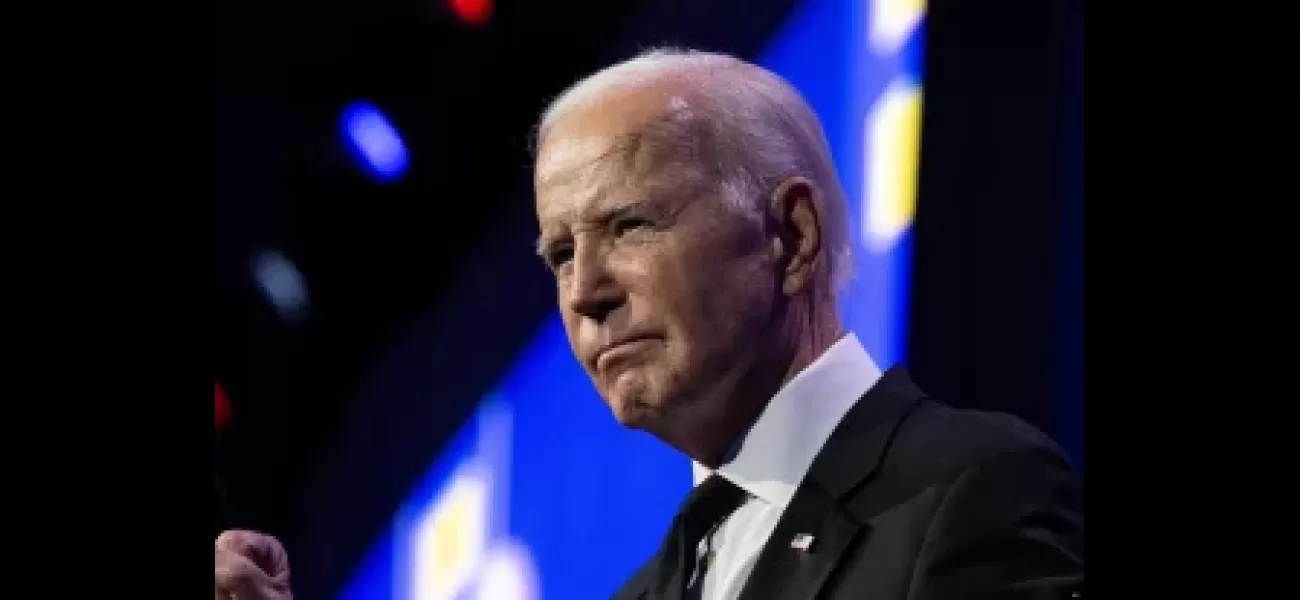Biden approves $95B in war aid, including support for Ukraine, Israel, and Taiwan.
Biden signed a $95B aid bill that includes support for Ukraine, Israel, and Taiwan, and could result in TikTok being sold or banned in the US.
April 24th 2024.

President Joe Biden signed a law on Wednesday that would provide a total of USD 95 billion in war aid to countries like Ukraine, Israel, and Taiwan. The bill also includes a provision that would give TikTok's parent company, ByteDance, nine months to sell the app in the United States or face a nationwide ban. The president spoke about the signing at a White House event, stating that it was a crucial moment and that they needed to act quickly.
The signing of this law brings an end to the long and difficult battle with Republicans in Congress over the much-needed aid for Ukraine. Biden expressed his satisfaction with the outcome, saying, "We rose to the moment, we came together, and we got it done." However, the delay in funding has caused significant damage to the administration's efforts to assist Ukraine in repelling Russia's invasion. Despite receiving a shipment of new weapons and ammunition, it will take time for Ukraine to recover from the months of setbacks.
As part of the USD 95 billion aid package, USD 1 billion will immediately be sent to Ukraine for military assistance. This is just the first installment of the USD 61 billion allocated for Ukraine. The package includes various weapons and equipment to strengthen the Ukrainian forces, who have been struggling with low morale as Russian President Vladimir Putin continues to make gains. However, it is uncertain if this assistance will be enough for Ukraine, given the significant damage that has been done to their infrastructure and the ongoing conflict in Eastern Ukraine.
John Kirby, the White House national security spokesman, acknowledged that the situation in Ukraine is not in their favor, and Putin is playing for time. He stated, "We've got to try to make up some of that time." The bill also includes aid for Israel, amounting to USD 26 billion, and an additional USD 1 billion for humanitarian relief in Gaza. Biden emphasized the importance of ensuring that this aid reaches Gaza without delay.
The delay in passing this aid package was due to some far-right members of the Republican party, including Reps. Marjorie Taylor Greene and Thomas Massie, who were against providing assistance to Ukraine. Former President Donald Trump also expressed his disapproval of the bill, citing that European allies should do more for Ukraine. However, his stance seems to have shifted in recent days, and he now acknowledges the importance of Ukraine's survival.
The European leaders have been concerned about a potential second Trump presidency, as he had previously shown a lack of support for Ukraine and the NATO military alliance. This was further heightened when he stated that he would allow Russia to act as they please with countries that do not meet defense spending goals. NATO Secretary-General Jens Stoltenberg criticized Trump's comments, stating that it would put American and European soldiers at risk. Biden also condemned Trump's words, calling them dangerous and un-American.
In reality, the White House had been working to secure additional funding for Ukraine long before Trump's controversial statements. In October, Biden used a prime time address to urge for the passage of the supplemental funding bill, just days after returning from a trip to Tel Aviv following an attack by Hamas militants on Israel. At the time, the House was in chaos, as the Republican majority had not yet selected a speaker to replace Rep. Kevin McCarthy. McCarthy had been ousted due to his decision to allow federal spending levels that were not favored by some members of his party.
On Wednesday, President Joe Biden signed a USD 95 billion war aid measure into law. The funding includes assistance for Ukraine, Israel, and Taiwan, as well as a provision that would require TikTok to be sold or banned in the United States. This announcement brings an end to the tough and drawn-out battle with Republicans in Congress over the much-needed aid for Ukraine.
In a White House event to announce the signing, Biden expressed his satisfaction, saying, "We rose to the moment, we came together, and we got it done." He emphasized the urgency of the situation and the need to act quickly. It has been a long road, but finally, progress has been made.
However, the months-long delay in securing this aid has caused significant damage to the Biden administration's efforts to support Ukraine in its fight against Russia's invasion. The funding impasse began in August, when President Biden first requested emergency spending for Ukraine. Despite the recent influx of weapons and ammunition, it will take time for Ukraine to recover from the setbacks it has faced.
Biden has approved USD 1 billion in immediate military assistance to Ukraine, with the first shipment expected to arrive in the next few hours. This is only a small portion of the USD 61 billion allocated for Ukraine in this package. The support includes air defense capabilities, artillery rounds, armored vehicles, and other weapons to bolster the morale of Ukrainian forces, who have suffered defeat after defeat in the face of Russian aggression.
However, the bigger question remains - can Ukraine make enough progress to sustain American political support before the aid runs out? The country has already suffered significant losses in its eastern region and extensive damage to its infrastructure. White House national security spokesman John Kirby acknowledges that the situation is not favorable for Ukraine, but the Biden administration is determined to make up for the lost time.
Meanwhile, tucked into the aid package is a provision that gives TikTok's parent company, ByteDance, nine months to sell the social media platform or face a nationwide ban. The president has the authority to grant a one-time extension of 90 days if there is a clear path to divestiture and significant progress has been made towards executing it. The administration and a bipartisan group of lawmakers have expressed concerns about TikTok's growing national security threat.
In response, TikTok has stated its intention to challenge this provision in court, calling it "unconstitutional." The company firmly believes that the law is on their side and that they will ultimately prevail.
This aid package also includes USD 26 billion in assistance for Israel and USD 1 billion in humanitarian relief for Palestinians in Gaza. Biden has urged Israel to ensure that the aid reaches Gaza without delay. However, the House Speaker Mike Johnson had delayed the vote on this supplemental aid package for months, facing backlash from far-right members of his party, including Reps. Marjorie Taylor Greene and Thomas Massie. These threats continue to persist.
Former President Donald Trump, who is considered the presumptive 2024 presidential GOP nominee, has been critical of European allies for not doing enough for Ukraine. Although he has not explicitly endorsed the aid package, his tone has shifted in recent days, acknowledging the importance of Ukraine's survival to the United States.
There has been growing anxiety among European leaders that a second Trump presidency would mean reduced US support for Ukraine and the NATO military alliance. This concern was heightened in February when Trump, in a campaign speech, suggested that he would let Russia do as they please with countries that fail to meet their defense spending goals. NATO Secretary-General Jens Stoltenberg quickly called out Trump for putting American and European soldiers at risk. In contrast, Biden condemned Trump's comments as dangerous and un-American, accusing him of playing into Putin's hands.
However, the Biden administration had already begun maneuvering to secure additional funding for Ukraine months before Trump's controversial speech. After returning from a trip to Tel Aviv following the attack by Hamas militants on Israel, Biden made a rare prime time address to make his case for the supplemental funding. At the time, the House was in disarray due to the struggle to elect a new speaker after Rep. Kevin McCarthy was ousted for allowing federal spending levels that were not supported by the far right within his party.
The signing of this law brings an end to the long and difficult battle with Republicans in Congress over the much-needed aid for Ukraine. Biden expressed his satisfaction with the outcome, saying, "We rose to the moment, we came together, and we got it done." However, the delay in funding has caused significant damage to the administration's efforts to assist Ukraine in repelling Russia's invasion. Despite receiving a shipment of new weapons and ammunition, it will take time for Ukraine to recover from the months of setbacks.
As part of the USD 95 billion aid package, USD 1 billion will immediately be sent to Ukraine for military assistance. This is just the first installment of the USD 61 billion allocated for Ukraine. The package includes various weapons and equipment to strengthen the Ukrainian forces, who have been struggling with low morale as Russian President Vladimir Putin continues to make gains. However, it is uncertain if this assistance will be enough for Ukraine, given the significant damage that has been done to their infrastructure and the ongoing conflict in Eastern Ukraine.
John Kirby, the White House national security spokesman, acknowledged that the situation in Ukraine is not in their favor, and Putin is playing for time. He stated, "We've got to try to make up some of that time." The bill also includes aid for Israel, amounting to USD 26 billion, and an additional USD 1 billion for humanitarian relief in Gaza. Biden emphasized the importance of ensuring that this aid reaches Gaza without delay.
The delay in passing this aid package was due to some far-right members of the Republican party, including Reps. Marjorie Taylor Greene and Thomas Massie, who were against providing assistance to Ukraine. Former President Donald Trump also expressed his disapproval of the bill, citing that European allies should do more for Ukraine. However, his stance seems to have shifted in recent days, and he now acknowledges the importance of Ukraine's survival.
The European leaders have been concerned about a potential second Trump presidency, as he had previously shown a lack of support for Ukraine and the NATO military alliance. This was further heightened when he stated that he would allow Russia to act as they please with countries that do not meet defense spending goals. NATO Secretary-General Jens Stoltenberg criticized Trump's comments, stating that it would put American and European soldiers at risk. Biden also condemned Trump's words, calling them dangerous and un-American.
In reality, the White House had been working to secure additional funding for Ukraine long before Trump's controversial statements. In October, Biden used a prime time address to urge for the passage of the supplemental funding bill, just days after returning from a trip to Tel Aviv following an attack by Hamas militants on Israel. At the time, the House was in chaos, as the Republican majority had not yet selected a speaker to replace Rep. Kevin McCarthy. McCarthy had been ousted due to his decision to allow federal spending levels that were not favored by some members of his party.
On Wednesday, President Joe Biden signed a USD 95 billion war aid measure into law. The funding includes assistance for Ukraine, Israel, and Taiwan, as well as a provision that would require TikTok to be sold or banned in the United States. This announcement brings an end to the tough and drawn-out battle with Republicans in Congress over the much-needed aid for Ukraine.
In a White House event to announce the signing, Biden expressed his satisfaction, saying, "We rose to the moment, we came together, and we got it done." He emphasized the urgency of the situation and the need to act quickly. It has been a long road, but finally, progress has been made.
However, the months-long delay in securing this aid has caused significant damage to the Biden administration's efforts to support Ukraine in its fight against Russia's invasion. The funding impasse began in August, when President Biden first requested emergency spending for Ukraine. Despite the recent influx of weapons and ammunition, it will take time for Ukraine to recover from the setbacks it has faced.
Biden has approved USD 1 billion in immediate military assistance to Ukraine, with the first shipment expected to arrive in the next few hours. This is only a small portion of the USD 61 billion allocated for Ukraine in this package. The support includes air defense capabilities, artillery rounds, armored vehicles, and other weapons to bolster the morale of Ukrainian forces, who have suffered defeat after defeat in the face of Russian aggression.
However, the bigger question remains - can Ukraine make enough progress to sustain American political support before the aid runs out? The country has already suffered significant losses in its eastern region and extensive damage to its infrastructure. White House national security spokesman John Kirby acknowledges that the situation is not favorable for Ukraine, but the Biden administration is determined to make up for the lost time.
Meanwhile, tucked into the aid package is a provision that gives TikTok's parent company, ByteDance, nine months to sell the social media platform or face a nationwide ban. The president has the authority to grant a one-time extension of 90 days if there is a clear path to divestiture and significant progress has been made towards executing it. The administration and a bipartisan group of lawmakers have expressed concerns about TikTok's growing national security threat.
In response, TikTok has stated its intention to challenge this provision in court, calling it "unconstitutional." The company firmly believes that the law is on their side and that they will ultimately prevail.
This aid package also includes USD 26 billion in assistance for Israel and USD 1 billion in humanitarian relief for Palestinians in Gaza. Biden has urged Israel to ensure that the aid reaches Gaza without delay. However, the House Speaker Mike Johnson had delayed the vote on this supplemental aid package for months, facing backlash from far-right members of his party, including Reps. Marjorie Taylor Greene and Thomas Massie. These threats continue to persist.
Former President Donald Trump, who is considered the presumptive 2024 presidential GOP nominee, has been critical of European allies for not doing enough for Ukraine. Although he has not explicitly endorsed the aid package, his tone has shifted in recent days, acknowledging the importance of Ukraine's survival to the United States.
There has been growing anxiety among European leaders that a second Trump presidency would mean reduced US support for Ukraine and the NATO military alliance. This concern was heightened in February when Trump, in a campaign speech, suggested that he would let Russia do as they please with countries that fail to meet their defense spending goals. NATO Secretary-General Jens Stoltenberg quickly called out Trump for putting American and European soldiers at risk. In contrast, Biden condemned Trump's comments as dangerous and un-American, accusing him of playing into Putin's hands.
However, the Biden administration had already begun maneuvering to secure additional funding for Ukraine months before Trump's controversial speech. After returning from a trip to Tel Aviv following the attack by Hamas militants on Israel, Biden made a rare prime time address to make his case for the supplemental funding. At the time, the House was in disarray due to the struggle to elect a new speaker after Rep. Kevin McCarthy was ousted for allowing federal spending levels that were not supported by the far right within his party.
[This article has been trending online recently and has been generated with AI. Your feed is customized.]
[Generative AI is experimental.]
0
0
Submit Comment





